Dog Behaviour Change Over Time

Understanding Dog Behaviour Change Over Time
Every dog changes as the months and years pass. Dog behaviour change over time is natural, predictable in many ways, and highly trainable with the right guidance. At Smart Dog Training we help families understand why behaviours shift, how to respond, and how to shape the path forward. Early in any plan a certified Smart Master Dog Trainer SMDT explains the forces behind dog behaviour change over time and sets a clear plan you can follow with confidence.
When you understand dog behaviour change over time you can make better day to day choices. You can set routines that support learning, give the right outlets for energy, and spot red flags before they grow. Most of all you can build a calmer, happier relationship that keeps getting better year after year.
Why Time Changes Behaviour
Time brings growth, hormones, new experiences, and changing needs. Puppies explore and learn fast. Adolescents test limits and need structure. Adults settle but still need mental work. Seniors slow down and may need adjustments for comfort. Dog behaviour change over time mirrors brain development, body changes, and life events in the home. When these shifts meet clear guidance, behaviour trends in a positive direction. Without guidance, habits can drift and small issues can snowball. Smart Dog Training programmes are designed to guide dog behaviour change over time so progress stays steady.
Key Drivers Of Change
Genetics Temperament And Health
Every dog starts with a unique blend of traits. Some are bold, some sensitive, some persistent, some easygoing. Those traits do not lock in outcomes, but they do set starting points. Health status matters just as much. Pain, gut upset, poor sleep, or sensory changes can shift behaviour quickly. Dog behaviour change over time often tracks with health events, so Smart Dog Training plans include simple health checks with your vet, kind handling, and rest schedules alongside training.
Socialisation Environment And Routine
Experience shapes the brain. Calm, repeated exposure to daily life builds confidence. Routine lowers stress and makes behaviour predictable. Clear communication speeds learning. If the environment is noisy or chaotic, or if rules change from day to day, dogs can become alert, jumpy, or unsure. At Smart Dog Training we structure daily routines that support calm while we train the skills your dog needs. This structured approach keeps dog behaviour change over time aligned with your goals.
Common Changes You May Notice
Fear Periods Reactivity And Focus
Many puppies pass through brief fear periods when normal sights seem strange. Teen dogs may show sudden reactivity, bark more at movement, or struggle to focus. Adults can become selective about dogs or people. Seniors may startle more as senses fade. These are classic points where dog behaviour change over time becomes obvious. Smart Dog Training teaches calm exposure, settling skills, and focus games so your dog learns what to do, not just what to stop.
- Puppy fear spikes may last days or weeks. We reduce intensity, create distance, and reward calm looking.
- Teen reactivity often peaks as confidence rises. We teach predictable patterns like look at me, hand target, and heel positions that turn chaos into clarity.
- Adult fine tuning targets impulse control, recall under distraction, and choices around guests or other dogs.
- Senior comfort work reduces startle, adds choice, and protects sore joints during greetings and play.
Attachment Independence And Separation
Puppies seek closeness, then try independence. Teens may push boundaries. Adults often settle into routine. Seniors may lean on you more again. Dog behaviour change over time in attachment is normal, but it needs guidance. Smart Dog Training teaches relax on a bed, gradual alone time, and calm greetings so your dog learns to be comfortable both with you and without you. That balance keeps confidence stable across life.
The Smart Dog Training Approach
Our method is simple to follow and proven in homes across the UK. We do not guess. We assess, plan, train, and proof skills so results last. Every step is led by a certified Smart Master Dog Trainer SMDT who understands dog behaviour change over time and how to guide it.
Assessment Planning Training Proofing
- Assessment. We capture a clear picture of dog behaviour change over time in your home. We note triggers, routines, sleep, diet, and health flags.
- Planning. We set goals that match your dog’s stage and your lifestyle. We map the exact skills that shift behaviour from where it is to where it needs to be.
- Training. We coach you through short, focused sessions. Skills include settle on cue, recall, loose lead walking, calm doorways, and polite attention.
- Proofing. We add real life layers, from home to garden to street and beyond. We protect confidence and adapt the plan as your dog progresses.
Ready to start solving your dog’s behaviour challenges? Book a Free Assessment and speak to a certified Smart Master Dog Trainer in your area.
Stage Specific Training Plans
Puppy Teenage Adult Senior
Smart Dog Training builds plans that match the stage your dog is in. This is how we guide dog behaviour change over time without overwhelm.
Puppy. We focus on confidence, handling, calm exposure, and simple life skills. Sit, down, settle on a bed, name response, and recall games create fast wins. We prevent problems by shaping choices now.
Teenage. We rebuild focus and impulse control as hormones and curiosity surge. Short sessions, structured play, and clear boundaries help you keep progress. We use distance from triggers, pattern games, and steady routines to reduce reactivity while building reliable recall and loose lead walking.
Adult. We fine tune. We reduce barking at the door, teach calm with visitors, and improve choices around dogs and people. We also maintain fitness and mental work so your dog stays flexible and ready to learn.
Senior. We protect comfort and confidence. We adapt exercise, add choice at greetings, and increase scent based enrichment. We lower stress and make sure skills like recall and settle still feel easy and rewarding.
Enrichment Exercise And Play
Enrichment drives healthy dog behaviour change over time by satisfying natural needs. We slot the right mix into your weekly routine so the brain stays busy and calm stays easy.
- Scent games. Scatter feeding in grass, find it searches in the lounge, and simple box sniffs build calm focus.
- Chew time. Durable chews after walks can lower arousal and support rest.
- Food puzzles. Simple puzzles for pups and more complex ones for adults extend mealtime and engage the mind.
- Appropriate exercise. Short, frequent walks for pups, structured movement for teens, varied routes for adults, gentle strolls for seniors.
With the right outlets, many issues fade. Barking drops when needs are met. Lead pulling softens when focus is trained and energy has a place to go. The result is steady dog behaviour change over time that holds in real life.
When To Seek Professional Help
Ask for help when behaviour changes quickly, affects safety, or feels stuck. Growling around food, sudden fear of people, lunging at dogs, or a new reluctance to be touched can signal pain or stress. Dog behaviour change over time should trend toward calm with training. If it does not, you need guidance. Smart Dog Training will review the full picture and tailor a step by step plan that fits your home, your schedule, and your dog.
How Long Does Change Take
Time frames vary by history, health, and practice. Many families see early wins in two to three weeks. Reliable skills in real life settings usually take one to three months of steady work. Deep patterns can take longer. What matters most is a clear plan, consistent practice, and regular reviews. Smart Dog Training sets weekly actions that stack into lasting dog behaviour change over time. We measure progress, celebrate wins, and adapt when life throws a curve.
FAQs
What is the biggest factor in dog behaviour change over time
Consistent routines paired with clear training. When daily life supports learning, change speeds up. Smart Dog Training builds both so your dog gets predictable practice that feels safe.
Why did my calm puppy become reactive as a teen
Hormones, confidence, and new experiences collide in the teen stage. Reactivity is common. We use distance, focus skills, and structured exposure to guide dog behaviour change over time back toward calm.
Can seniors still learn new behaviours
Yes. Seniors learn well with short sessions, higher value rewards, and comfort focused setups. Adjust exercise and surfaces, then keep training light and positive.
How do I track progress
Keep a short log. Note what happened, where, and how fast your dog settled. Simple ratings help you see dog behaviour change over time even when it feels slow day to day.
What if behaviour got worse after a scary event
That can happen. We reduce intensity, rebuild safety, and set micro goals. Smart Dog Training designs step wise plans that rebuild confidence and reverse setbacks.
Do I need special equipment
Usually not. A flat collar, a well fitted harness, a standard lead, and suitable treats are enough. We will advise if anything else would make training smoother in your case.
Will my dog ever be perfect
Dogs are individuals, not machines. The goal is reliable, safe, and calm behaviour in your real life. With coaching from a Smart Master Dog Trainer SMDT you can achieve lasting improvements that matter.
Conclusion And Next Steps
Dog behaviour change over time is certain. The question is whether it bends toward calm and confidence or drifts into habits you do not want. With Smart Dog Training you get a clear map, regular support, and practical steps that fit your life. We pinpoint the causes, teach the skills, and build routines that make good behaviour the easy choice. Your dog can change. Your home can be peaceful. The path is ready for you.
Your dog deserves more than guesswork. Work with a certified Smart Master Dog Trainer SMDT and create lasting change. Find a Trainer Near You



